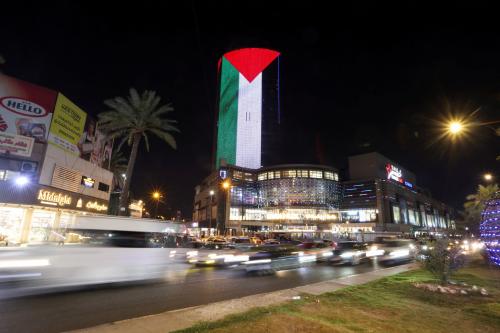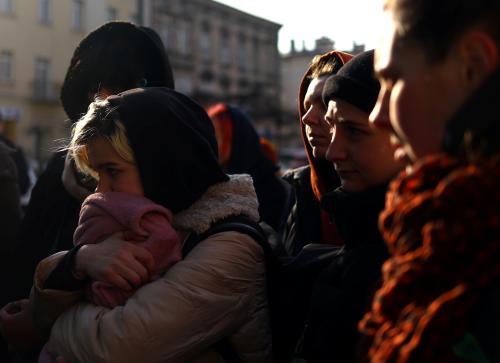How are things going in Iraq? The short answer, unfortunately—based on Brookings’ Iraq Index and my own assessments—is not very well. There is still considerable hope, and much that does go well in Iraq. But on balance, there is more reason for worry than optimism right now.
Any counterinsurgency and nation-building effort requires progress on three fronts—security, economics, and politics. The first is going badly in Iraq. Few will be surprised to hear this, but it remains true even if one looks below the surface at more detailed indicators than the daily casualties. Economics shows some promise, and at least as much good news as bad overall, but progress is slow—perhaps too slow to help defuse the insurgency very much. Finally, politics is of course in great flux right now. But public optimism, in terms of Iraqis’ views about their own country’s future and their government, is weakening. And the referendum process we are now witnessing seems more likely to estrange Sunni Arabs, who still form the core of the insurgency, than to bring them aboard. There is hope for progress here, but time is being lost.
Consider first security. While this fall has begun somewhat better than the summer trends, coalition troop fatalities have averaged about 65 to 70 a month since the spring—roughly the average since Saddam Hussein fell. Other news is even worse. Iraqi security forces have lost far more personnel in the last five months than in any previous comparable period; their fatalities have been averaging about 60 a week. September saw more multiple-fatality bombings than any previous month. Iraqi civilian fatalities have, accordingly, been at historic highs for the last 30 months as well. The crime rate (independent of political violence) remains the Middle East’s worst, with no sign of progress. Oil infrastructure is suffering about 10 attacks per month, slightly above the average since Hussein fell. And insurgents have been mounting an average of about 90 attacks a day in recent weeks, again the highest tally since Hussein was overthrown.
There is some good news on the security front nonetheless. It is principally in the form of progress in Iraqi security forces. Some 30,000 are now considered to be trained to the first or second tier of proficiency, and that is probably a fair assessment of where things stand. The second level means that they can conduct most operations on their own—good enough to allow major coalition troop reductions next year, if the trend continues. That said, the continued high tally of fatalities has continued to weaken the Iraqi security forces, which also lack experienced officers. And no one really knows how well the security forces will hold together if Iraq begins to splinter ethnically and coalition forces begin to depart. So even this good news must be tempered.
Thankfully trends are somewhat better on the economic front. GDP is up a good deal in the last two years, and is now about 50 percent greater than in the latter part of Hussein’s reign. Of course this reflects a somewhat skewed economy, pumped up by foreign aid and high oil prices, but it is better than the alternative nonetheless. Numbers of students in school exceed those of Hussein’s reign by perhaps 20 percent. Telephone service has snowballed; 4.5 million now have service, in contrast to less than 1 million before the war. The Internet is reaching hundreds of thousands for the first time. Purified water and sewage treatment services, while still uneven, now reach about half the population, a decided improvement since Hussein’s day.
But three huge negatives continue to weigh down even the economy. First, unemployment remains very high, perhaps 30 or 35 percent, and underemployment may include 20 to 25 percent of the working age population on top of that. Second, the security environment discourages much investment, meaning that Iraq is not developing a particularly healthy entrepreneurial economy. Third, and related to the security problems, electricity is very mediocre. While average power levels have finally reached those of Hussein’s latter years, demand has soared so much that most Iraqis consider service to have deteriorated, because the gap between what is expected and what is provided has grown greatly. And in fact, power outages are so common that Iraqis cannot count on electricity—Baghdad has been averaging 7 to 8 hours a day, much worse than during Ba’athist rule.
So with a bad security environment and mediocre economy, Iraq’s main hope must lie in politics. In fact, this is usually the case in counterinsurgencies, and American officials will concede the point that without major political progress, their efforts on the ground are unlikely to suffice.
Politics, and the related matter of public opinion, were promising in Iraq for most of the period since the invasion of 2003. Iraqis routinely said, with 70 percent or more voicing such a view, that they were optimistic about their future. Even as they turned against the United States in 2004, even as they witnessed so much carnage in their country, they remained glad that Hussein was gone and hopeful for better days ahead. Even Sunni Arabs were beginning to show guarded optimism about the time of the January 2005 vote, with 40 percent expressing a belief that things were getting better.
Alas these positive trends have been largely lost since the violence resumed in full force this past spring. Now fewer than 50 percent of Iraqis express optimism about the future; fewer than 50 percent have strong faith in their government; less than half see life getting better.
All of that puts a great deal of pressure on the October referendum results and the scheduled December elections for a full-term government. If the votes further embitter Sunni Arabs, that would bode very badly for Iraq’s future, with the chances of an intensifying insurgency or even all-out civil war growing. It is critical, in that spirit, that everything reasonable be done to give the Sunni Arabs a full stake in the future Iraq. They may collectively choose the path of resistance anyway, but it would be a major mistake not to try to prevent that.
Among the most important issues, therefore, are those of oil revenue allocation and de-Ba’athification. The draft constitution appears too punitive toward the Sunni Arabs on both points. On the first, Shiite and Kurds should correct the constitution’s mistakes (or at least dangerous ambiguities) and state emphatically that all of Iraq’s oil wealth will forever be shared equitably among all Iraqis on a per capita basis, regardless of where it is found. On the second, Iraq needs a process modeled after South Africa’s that allows low-level Ba’athists to re-enter normal life and mid-level Ba’athists to acknowledge their wrongdoings and accept some limited form of punishment as a means of repenting and re-earning the right to be part of society. If these types of steps are not taken, and soon, Iraq’s future looks more foreboding than promising.



Commentary
Op-edOn the Precipice in Iraq
October 17, 2005